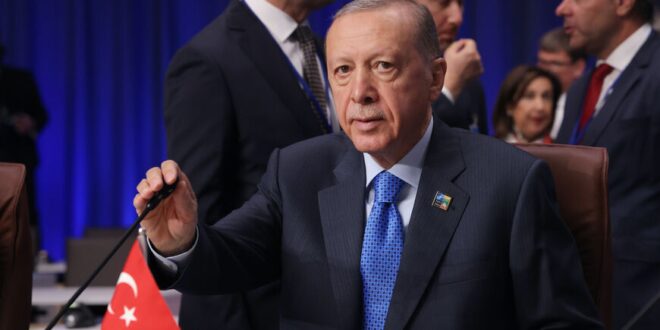The comments clearly signal that the drama over Sweden’s accession is not over, and Turkey’s push to overcome Congressional sanctions and acquire F-16 fighter jets remains the main sticking point.
As NATO leaders continue to applaud Turkey’s President Recep Tayyip Erdogan for his last minute U-turn greenlighting Sweden’s NATO membership during their ongoing summit in Vilnius, the Turkish strongman warned that his parliament was unlikely to ratify the Nordic nation’s accession before going into recess next week until Oct. 1.
“The parliament is not in session for the upcoming two months…but our target is to finalize this matter as swiftly as possible,” Erdogan told a news conference Wednesday.
Earlier his top adviser Ali Cagatay Kilic told Nikkei Asia, “It’s not like you push a button and the next day everything happens, so I don’t see it happening this week.” The comments are a clear sign that the drama over Sweden’s accession is not over and that Turkey’s push to overcome congressional sanctions and acquire F-16 fighter jets from the United States remains the main sticking point, sources familiar with months of back-channel diplomacy aimed at getting Turkey to approve Sweden’s membership told Al-Monitor on condition of anonymity.
Yet only hours earlier, the deal seemed to be all but done as Erdogan and President Joe Biden met for more than an hour on the sidelines of the summit, oozing bonhomie before the cameras. Hinting at a possible invitation to the White House, Erdogan declared the meeting was “just a warm-up session” for further facetime with the US president. An equally effusive Biden told Erdogan, “I want to thank you for your diplomacy and your courage to take that on. And I want to thank you for your leadership.”
Pro-government newspapers in Turkey hailed the meeting as “a new era” in Turkey’s crippled ties with Washington and Erdogan pledged to get the parliament to ratify Sweden’s accession as soon as possible.
Under the one-man regime he has painstakingly erected, Erdogan has the authority to extend the parliament’s session and so can “push a button,” so to speak. Most critically, Bob Mendendez, the New Jersey Democrat who heads the Senate Foreign Relations Committee and is the chief opponent of easing military sanctions on Turkey, appeared to be reversing his position as well. On Monday, Menendez said there was a temporary “lull” in Turkey’s “aggression against its neighbors” — he was likely referring to Greece and Kurdish-run northeast Syria — and that he was in talks with the Biden administration about the sale of 40 F-16 fighter jets and 79 modernizations kits for Turkey’s existing fleet.
The rub lies in what he said next. There needed to be a way to “beef up Greece’s security” and obtain “assurances” about “future actions.” Asked how long it might take him to make a decision, he said, “Probably, if there can be one, in the next week.” Turkey wants him to relinquish his hold immediately and until such time its parliament, where Erdogan and his far-right coalition partner hold a majority, is unlikely to ratify Sweden’s membership. “It’s down to who blinks first,” one of the sources briefing Al-Monitor said.
The sources revealed that Erdogan had prevented any reference to “ratification” in the Vilnius Summit Communique that was issued Tuesday. The compromise formula laid out in Article 4 of the text read, “We look forward to welcoming Sweden as a full member of the Alliance and, in this regard, welcome the agreement reached between the NATO Secretary General, the President of [Turkey] and the Prime Minister of Sweden.”
A significant number of Menendez’s constituents are ethnic Greeks and Armenians. Hence, US diplomacy has focused on seeking to reassure Greece, which has demanded that Turkey halt its military flights over the Greek islands in the Aegean that Turkey claims are being militarized in violation of international treaties. The broader aim is to reach a comprehensive settlement between the traditional rivals, who are at odds over territorial rights in the Aegean and Mediterranean, that would satisfy security concerns on both sides in a region seen as vital to NATO interests. Turkey is up in arms over the proposed sale of next-generation F-35 stealth fighters to Greece that was approved by the Senate earlier this year. Turkey, which was part of the F-35 consortium producing the jets, was kicked off after refusing to cancel its purchase of Russian-made S-400 anti-missile batteries.
Serendipitously, Greece and Turkey are expected to take delivery of their respective planes around the same time — at some point after 2027.
Former Republican senator and current US ambassador to Turkey Jeff Flake has played a key role in seeking to sway Menendez, the sources said. Erdogan had lambasted Flake for meeting with Kemal Kilicdaroglu, the head of Turkey’s main opposition party who ran and lost against Erdogan in presidential elections last month. The Turkish leader said he would no longer meet with him. Flake “has proven more effective than any,” one of the sources noted, saying his years of experience cutting deals on the Hill had helped.
Today’s meeting between Erdogan and Greece’s newly reelected conservative Prime Minister Kyriakos Mitsotakis in Vilnius offered some hope for a breakthrough. Mitsotakis has made repairing ties with its longtime enemy Ankara a priority. The talks were held in “a good atmosphere,” the Turkish president’s Directorate of Communications said, adding that the two leaders had agreed that it is “to the benefit of both countries that the positive climate that emerged in bilateral relations in recent months has continuity and consistency.”
Unnamed Greek officials were cited in the Greek press as saying there was a “sincere discussion held in a positive atmosphere.” Prior to the meeting Mitsotakis told the media, “We have significant differences. But we can agree on a road map so that we can resolve our most important geopolitical difference: the delimitation of maritime zones, namely exclusive economic zones and the continental shelf in the Aegean and the Eastern Mediterranean.”
 Eurasia Press & News
Eurasia Press & News


